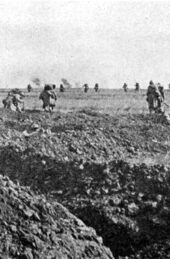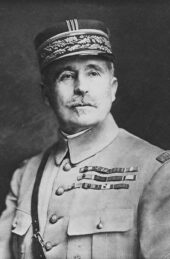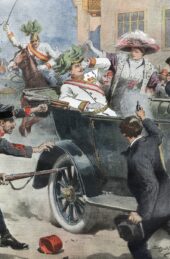Bosnia and Herzegovina was a hotly disputed territory in 1914. It had been annexed by the Austro-Hungarian Monarchy in 1910 from the crumbling Ottoman Empire, but was also claimed by neighbouring Serbia and had a growing nationalist movement that wanted it to be part of a South Slav state. The decision to send the crown prince of Austro-Hungary into such an unstable region, to attend army manoeuvres, was largely made in an attempt to strengthen the monarchy’s rule; charming the local population and demonstrating its military might. It does not appear to have been seen as a great risk by the authorities. Austro-Hungarian intelligence was aware of plots against Archduke Ferdinand and the danger posed by Serbia who were attempting to resist Austro-Hungarian expansion in the region. There was however no definite evidence of a plot against Archduke Ferdinand, threats of this kind were also not unusual in the increasingly volatile Austro-Hungarian monarchy and were therefore ignored by the authorities.
The security for Franz Ferdinand’s visit fell to the military governor of Bosnia and Herzegovina, General Oskar Potiorek. Potiorek wanted to become the Chief of the General Staff and saw the visit as an opportunity to stake his claim; paying close attention to every aspect of the Archduke’s needs during the visit, from the length of his stirrups to the construction of a chapel in his hotel. However he ignored the security aspects of the visit.

Archduke Ferdinand, his wife Sophie, and their children.
Unlike other areas of the Monarchy there hadn’t been any violence attributed to nationalism in Bosnia. Potiorek didn’t recognise the growing nationalism among the youth that had inspired a Young Bosnia Movement and the assassins. This is largely where my novel is focused with a fictitious Hungarian official, Lazlo Breitner, investigating the dangers of the Young Bosnia movement and desperately trying to warn Potiorek and the Archduke of the imminent threat.
There were officials in Sarajevo who did understand the growing danger from these schoolboys and that they were working with Serbia. The police commissioner for Sarajevo, Dr Edmund Gerde, advised Potirok that there was a conspiracy, two weeks before Franz Ferdinand’s visit. Dr Sunaric the vice president of the Bosnian Parliament urged Potiorek to cancel the archducal visit because of possible young Bosnia activity. Potiorek however stated that the Archduke would be guarded by his officers and dismissed the warnings.

Violence in Sarejevo in June 1914, prior to Ferdinand’s visit.
Consequently there was inadequate protection for the Archduke during his visit, with 120 gendarmes to provide security in a city of over 50,000 people. Bringing in additional policemen was deemed to be too expensive, as all of the budget had gone on building the chapel for Franz Ferdinand.
Archduke Ferdinand himself was warned about the general possibility of an assassination attempt, but travelled to Bosnia nonetheless, albeit reluctantly. Franz Ferdinand’s wife Sophie insisted on accompanying her husband when she heard of the threats, as she did not believe anyone would shoot at him if a woman was by his side.
The night before the Royal couple were due to visit Sarajevo, Sophie met Doctor Sunaric at a state dinner and told him that he was wrong. Wherever they had been, ‘everyone had greeted them with great friendliness’. Doctor Sunaric responded ‘Your Highness, I pray to God that when I have the honour of meeting you again tomorrow night, you can repeat those words to me.’
One of the most tragic aspects of the whole affair is that Archduke Ferdinand decided to cancel the visit to Sarajevo following the state dinner, possibly having been warned by the local police, but he was persuaded to complete the planned itinerary by Colonel von Merizzi, Governor Potiorek’s aide-de-camp.

Alan Bardos is the author of The Assassins, published by Sharpe Books.






